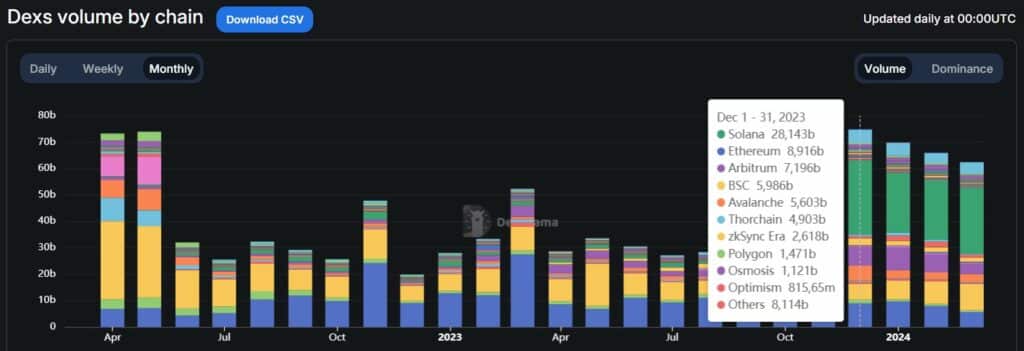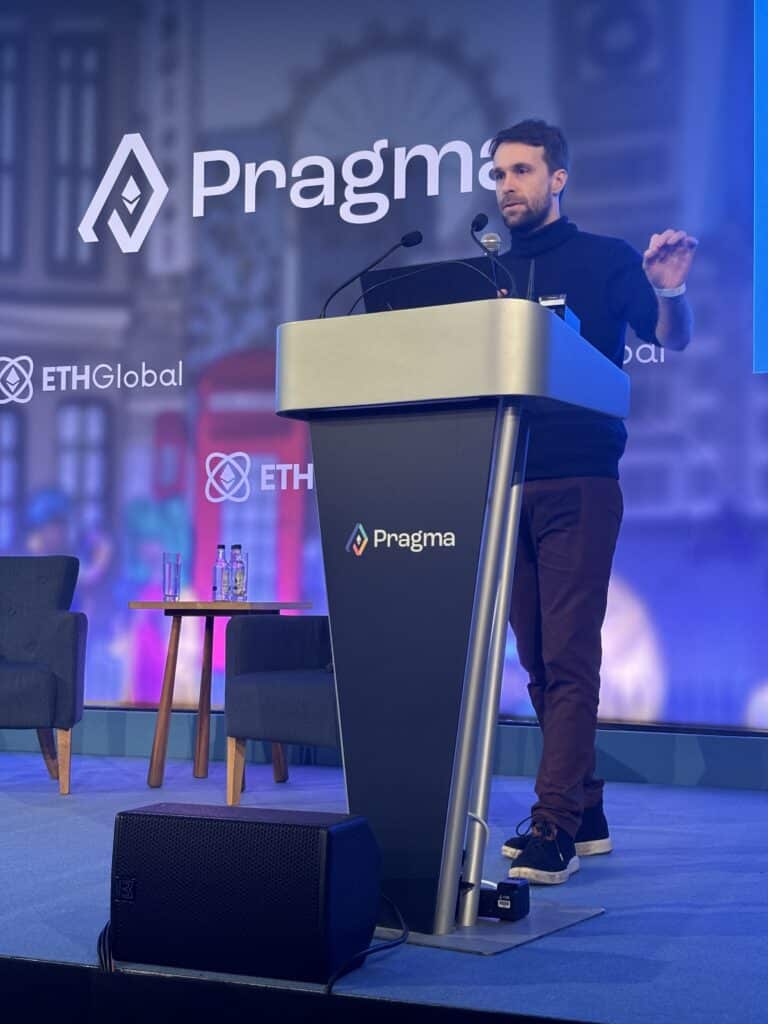Disclosure: The views and opinions expressed here belong solely to the author and do not represent the views and opinions of crypto.news’ editorial.
The purge, the splurge, and the scourge—these are the terms the eponymous co-founder of Ethereum, Vitalik Buterin, used to describe the upcoming changes to Ethereum at a recent event in London.
Every week, crypto.news brings you #hashtag hearsay, a gossip column of scoops and stories shaping the crypto world. If you have a tip, email Dorian Batycka at [email protected]
On March 14, luminaries from the Ethereum community and beyond descended on London for ETHGlobal’s Pragma conference. Spearheaded by speakers like Vitalik Buterin and fellow Ethereum researcher Justin Drake, Chainlink’s Sergey Nazarov, and Lens Protocol’s Stani Kulechov, the event took place in Christ Church Spitalfields, with attendees—including myself—anxious to know where Ethereum is headed post-Dencun upgrade.
Buterin began by stating that “the Ethereum ecosystem is in the process of making a very big transition.”
According to Buterin, this transition will shift from a focus on layer-1s (L1s) and core developer-centric advancements to enhancing usability and layer-2 (L2) solutions, like zkSync, Arbitrum, and Optimism.
“The way that I see it is that the first decade of Ethereum is this kind of mostly inwardly focused ecosystem, developing things for itself, focused on being tech geeks, trying to satisfy tech geeks and creating beautiful technology. But the second decade of Ethereum needs to actually have a big impact on the real world.”
Vitalik Buterin
Roll-ups, a key player in this transition, are L2 solutions that process and store transaction data on a sidechain before bundling (or “rolling up”) transactions together onto the main Ethereum chain, significantly enhancing scalability and efficiency without compromising security.
Buterin says that what’s next is a shift towards more scalable, secure, and user-friendly horizons. Following the Dencun upgrade, which saw some L2s like Starknet’s gas fees reduced by as much as 99%, Ethereum’s stride towards achieving basic roll-up scaling—a leap made possible through advancements in technology like EIP-4844 and the roll-up technology spearheaded by teams like Arbitrum, will now shift focus to allow for more user-friendly applications to take root on Ethereum.
“We have officially hit basic roll-up scaling, but we still have full roll-up scaling to go,” Buterin articulated, marking this milestone as the onset of a journey toward fully unlocking Ethereum’s scalability potential.
The purge, the splurge, and the scourge
However, Buterin cautioned that more work is still needed. This he referred to as the “purge.”
“We do not want the Ethereum protocol to be something that just keeps on accumulating junk,” Buterin added, underscoring the necessity of a lean and agile blockchain protocol for Ethereum’s future. “We want Ethereum to become cleaner, and this is what the purge is about; it’s about making users’ lives easier.”
“Then you have the splurge,” Buterin said. “Account abstraction, Ethereum Virtual Machine (EVM) improvements, making the EVM more friendly to advanced cryptography.”
Lastly, Buterin described the “scourge […] which is dealing with economic centralization risk and mitigating it.” Referring to maximum extractable value (MEV) searchers and liquid staking, Buterin said that the next phases of Ethereum upgrades will work on mitigating the risks posed by economic centralization.
The elephant in the room
The elephant in the room at any Ethereum conference is, however, often Solana.
According to DefiLlama’s data, over the last four months, Solana has significantly outperformed in terms of DEX volume, recording a total volume of $98.54 billion. This starkly contrasts with Ethereum mainnet’s $32.16 billion, not even reaching one-third of Solana’s volume. When taking into account all Ethereum L2 solutions, the combined volume only reaches $67.31 billion, highlighting a clear dominance by Solana.

In the past 90 days, Ethereum hasn’t led in volume on any day, with Solana consistently holding the top spot and BSC making occasional appearances.
While Ethereum enthusiasts may hold onto their narratives, the numbers paint a different picture. Given Solana’s performance, Ethereum upgrades seem to be playing catchup; think again.
According to Justin Drake, a researcher at the Ethereum Foundation, the potential of Ethereum sharding and shared infrastructure components like settlement and data availability will eventually enhance the network’s performance. Comparing developments to low-network fee blockchains like Solana, Drake introduced the concept of shared sequencing and execution as forward-looking innovations designed to boost Ethereum’s composability and efficiency. “In some sense, we’re trying to recreate the user experience of Solana low latency user experience with synchronous composability on Ethereum,” Drake said.

Beyond the technical developments, a theme echoed frequently at Pragma in London was that by moving away from Ethereum’s tech-centric approach, the blockchain should now focus on more user-friendly and accessible apps for end-users.
Post-Dencun usability
Pedro Gomes, founder of Wallet Connect, said that “user experience-focused upgrades need to happen within Ethereum,” a claim echoed by several of the other speakers as well. Nick Johnson, founder of the Ethereum Naming Service (which just inked a deal with GoDaddy), said that “naming is ultimately a usability issue.” While Anurag Arjun, founder of Avail and former Polygon dev, opined that roll-ups will eventually lead to greater user experience. “I am very bullish on app-specific roll-ups, roll-ups that become mature to a point when app devs will find them easy to use and integrate almost seamlessly.”
What does this all mean for the Ethereum post-Dencun update? Ethereum’s past and its trajectory toward a more accessible, secure, and scalable future serve as a reminder of the blockchain’s foundational goals. It’s not just about creating a decentralized platform but about ensuring that Ethereum evolves to meet the needs of its growing community and the broader digital ecosystem. As Ethereum continues on its roadmap, the numerous challenges ahead—not least of which include formidable competition from Solana—remain plentiful.
Credit: Source link






















 Bitcoin
Bitcoin  Ethereum
Ethereum  XRP
XRP  Tether
Tether  Solana
Solana  USDC
USDC  Dogecoin
Dogecoin  Cardano
Cardano  Lido Staked Ether
Lido Staked Ether  TRON
TRON  Wrapped Bitcoin
Wrapped Bitcoin  Chainlink
Chainlink  Wrapped stETH
Wrapped stETH  Avalanche
Avalanche  Sui
Sui  Stellar
Stellar  Litecoin
Litecoin  Toncoin
Toncoin  Shiba Inu
Shiba Inu  Hedera
Hedera  LEO Token
LEO Token  USDS
USDS  Hyperliquid
Hyperliquid  Polkadot
Polkadot  WETH
WETH  MANTRA
MANTRA  Bitcoin Cash
Bitcoin Cash  Bitget Token
Bitget Token  Ethena USDe
Ethena USDe  Wrapped eETH
Wrapped eETH  Uniswap
Uniswap  Monero
Monero  NEAR Protocol
NEAR Protocol  Pepe
Pepe  WhiteBIT Coin
WhiteBIT Coin  Bittensor
Bittensor  Ondo
Ondo  Aave
Aave  Aptos
Aptos  Internet Computer
Internet Computer  Dai
Dai  Official Trump
Official Trump  Mantle
Mantle  Ethereum Classic
Ethereum Classic  Tokenize Xchange
Tokenize Xchange  OKB
OKB  Gate
Gate  sUSDS
sUSDS  Sonic (prev. FTM)
Sonic (prev. FTM) 
